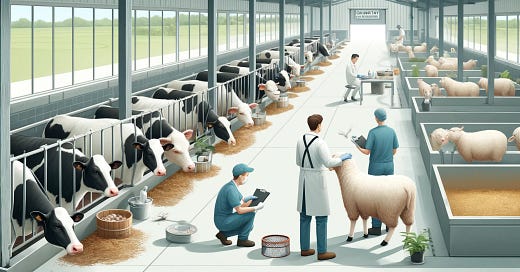How to Prevent Screw Worm Myiasis in Livestock
Preventing screwworm myiasis is essential to maintaining healthy livestock.
Screwworm myiasis is a severe issue for livestock owners. This condition, caused by the larvae of the screw worm fly, can lead to severe tissue damage and, if untreated, death. Preventing screwworm myiasis is essential to maintaining healthy livestock. Here are some effective strategies to protect your animals from this harmful infestation.
Maintaining Clean and Sanitary Conditions
First and foremost, keeping livestock environments clean is crucial. Regularly removing waste, uneaten food, and other organic matter reduces breeding grounds for screwworm flies. Additionally, promptly treating and disinfecting any wounds on your animals prevents flies from laying eggs in open sores. Routine inspections help identify potential problem areas before they become significant issues.
Using Fly Control Measures
Implementing effective fly control measures is another vital step. Fly traps, insecticides, and repellents can significantly decrease the screw worm fly population in and around livestock areas. According to manufacturer instructions, ensuring the proper application of these products maximizes their effectiveness while minimizing harm to your animals and the environment.
Regular Veterinary Check-Ups
Regular veterinary check-ups are essential in early detecting and treating screwworm myiasis. Veterinarians can provide targeted treatments and recommend best practices tailored to your specific livestock. These check-ups also offer an opportunity to discuss concerns and stay updated on the latest preventive measures.
Educating and Training Farm Staff
Another crucial strategy is ensuring that all farm staff are educated about screwworm myiasis and trained in preventive measures. Training programs should cover identifying early signs of infestation, proper wound care, and using fly control products. Well-informed staff are better equipped to maintain a healthy environment for the livestock.
Implementing Quarantine Procedures
Lastly, implementing quarantine procedures for new or returning animals can prevent the introduction of screwworm myiasis into your livestock population. Isolating these animals for a period allows for thorough inspection and treatment, if necessary before they join the main herd. This step is critical if the animals come from areas with screwworm infestations.
In summary, preventing screwworm myiasis in livestock involves the following:
Maintaining clean environments.
Using fly control measures.
Ensuring regular veterinary check-ups.
Educating farm staff.
Implementing quarantine procedures.
These steps can protect your animals from this harmful condition and promote a healthier, more productive farm. Take action today to safeguard your livestock and secure your livelihood.



